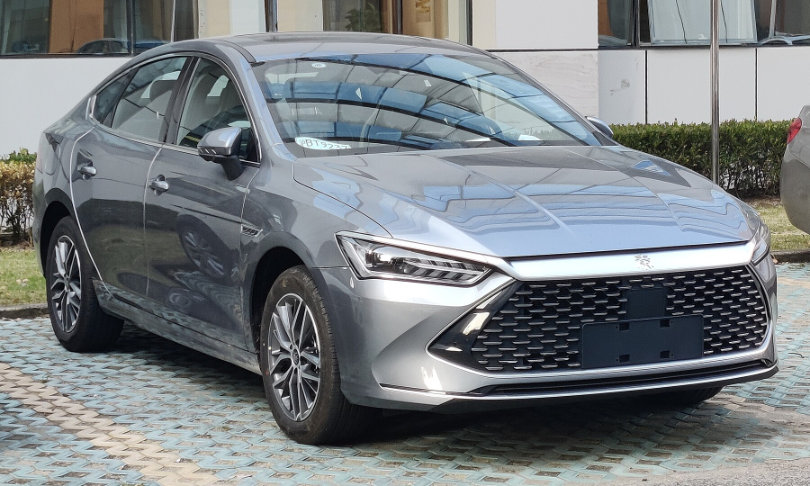China Files WTO Grievance Over Alleged Unlawful U.S. EV Subsidies
ON 03/27/2024 AT 02 : 43 AM

The People’s Republic of China yesterday filed documents with the WTO alleging that new U.S. regulations regarding the purchase of electric vehicles constitute unlawful and discriminatory subsidies designed to restrain trade. This is something of a case of the pot calling the kettle black. China heavily subsidizes its EV industry as well.
The regulations the PRC is referring to are provisions of the 2022 Inflation Reduction Act. That legislation, a key piece of the Biden gang's restructuring of business priorities in the country designed to support and rebuild domestic industries, included special financial credits for those purchasing electric vehicles in the United States. Up through the end of 2023, buyers were eligible for tax credits of up to $7,500 on new vehicles and up to $4,000 on used EVs. There were various restrictions on the purchases, including that the cars must be for personal use, not resale; must be at least 2 years older than the original date of the car purchase when it was new, for the used car credit; and meet certain basic requirements for EV functionality as defined in the law.
As of January 1, 2024, the rules for the credits changed in some significant ways, including further restrictions on the sourcing of key components, and the ability to transfer the sales credit to dealers, effectively lowering the purchase price for all.
In all cases, the law requires cars to be assembled in North America and purchased for use primarily within the U.S. to be eligible for the credits. It also dictates that most of the components used in the vehicles’ EV batteries must be sourced from outside of China, Russia, Iran, or North Korea, for consumers to take advantage of the U.S.-sponsored purchase savings under the Act.
According to information provided by the U.S. Department of Energy, these restrictions on the price subsidy apply “for new electric, fuel cell electric, and plug-in hybrid electric vehicles acquired, delivered and placed in service after August 16, 2022.”
The purpose of the Act was to make EV and low-emissions car purchases more attractive to consumers, as well as to support domestic electric vehicle manufacturers and create jobs.
The Act is also clearly targeting the accelerating growth of the Chinese electric vehicle industry and the rechargeable battery systems built into them. The law was also crafted in the hopes that providing some special benefits for U.S. EV makers, the financial fortunes of the Big Three U.S. automakers and Tesla could grow as global “green” mandates to minimize greenhouse gas emissions drive the industry.
If the subsidies for “built in America” EVs and batteries with most materials, such as rare earth minerals, sourced from sources outside of China, are allowed to stand, Beijing sees those credits causing severe economic damage for its industry, and blunting its own economic growth in markets it already dominates. As one example, BYD, its largest automaker, has already overtaken Tesla as the largest EV manufacturer not just in China but also globally. CATL, a Chinese company which manufactures EV batteries, already controls 34% of the global EV battery market.
Both companies, as well as their own China-based competitors, are also rapidly expanding their outreach outside of China, with North America being the prized market they hope to penetrate and dominate soon. EV makers BYD and Jaecoo, a new Chinese EV brand from Chery Automobile Company, China’s third-largest auto manufacturer, are both preparing to set up manufacturing plants in Mexico this year. On the battery front, CATL has already established EV battery-making partnerships in Chile and Bolivia, for example, and is currently scouting potential Mexican manufacturing sites in either Ciudad Juarez, Chihuahua, or in Saltillo, in the state of Coahuila. It has already acknowledged it plans to use the Mexican facility to provide batteries for Tesla’s gigafactory based in Austin, Texas; it is also expected to provide batteries at least for BYD and possibly other auto manufacturers either already established in Mexico or moving there soon.
China wants these plants in Mexico for multiple reasons. By building factories in Mexico, the products to be produced there will fall under the beneficial terms of the U.S.-Mexico-Canada (USMCA) agreement, which covers most North American facilities. By being local to North America, these sites also lower the cost of shipments into the highly lucrative U.S. market versus sending them directly from China. The Chinese autos to be built in Mexico will also be manufactured at far lower price points than those of the U.S. Big Three automakers and Tesla, thanks in part to China’s own subsidies for its manufacturers and use of slave labor.
The combined impact of these benefits for China could, according to a recent report by a US. auto industry association, “end up being an extinction-level event for the U.S. auto sector, whose centrality in the national economy is unimpeachable”.
With its latest decision to file a complaint regarding the purchase credits for EVs the United States is offering under the Inflation Reduction Act, China hopes to fortify its position as the world’s dominant maker of these vehicles and their batteries, and complete Beijing’s “end run” around multiple U.S.-based regulations intended to prop up its economy while enriching its oligarchs.
China’s Ministry of Commerce says it filed the World Trade Organization complaint to ensure fair competition for Chinese as well as other suppliers in the growing global electric vehicle market.
“Under the pretext of ‘responding to climate change’ and ‘environmental protection’, the US has formulated discriminatory policies through its Inflation Reduction Act regarding new energy vehicles, excluding products from China and other WTO members from subsidies,” the Ministry said in a statement published yesterday. “Such exclusions distort fair competition, disrupt global industrial and supply chains and violate WTO principles such as national treatment and most-favored-nation treatment.
“China is firmly opposed [to what the U.S. is doing],” the statement continued. “We urge the US to abide by WTO rules, respect the development trend of the global new energy vehicle industry and rectify its discriminatory policies.”
As with all things WTO-related, this is a dispute which will take time to resolve. Ever since career-criminal Bill Clinton got China in the WTO without it meeting the qualifications for membership, China has used the WTO as a weapon against the U.S. It somehow manages to retain WTO membership even though it still doesn't meet the requirements.
Based on other statements, the coming assault by China on the U.S. auto industry is also going to be challenged by the U.S. in another way, by claiming the sales of Chinese-built vehicles represent a national security threat. That was disclosed by U.S. Commerce Secretary Gina Raimondo during a January 30, 2024, gathering of the Atlantic Council, a Washington, D.C.-based policy think tank which focuses on international affairs.
In a special “fireside chat” session at that event, Raimundo told her audience that the new categories of automotive products which include electric as well as autonomous vehicles are “collecting a huge amount of information about the driver, the location of the vehicle, [and] the surroundings of the vehicle”. (Teslas do the same.) With China beginning to dominate larger segments of that industry, she asked the group, “Do we want all that data going to Beijing?”
While her comments were focused just on the Chinese auto industry, the issue she raised is part of a broader concern the occupants of the White House are exploring regarding imported goods from other countries. According to sources, Team Biden may soon be signing off on a presidential executive order which targeting countries such as China, and blocking imports of goods have the potential to access large quantities of “highly sensitive” individual data.
If that happens, expect another challenge by China to the World Trade Organization, or some other escalation to the trade war which began when Donald Trump’s team was in power.
 Asiabiznews
Asiabiznews